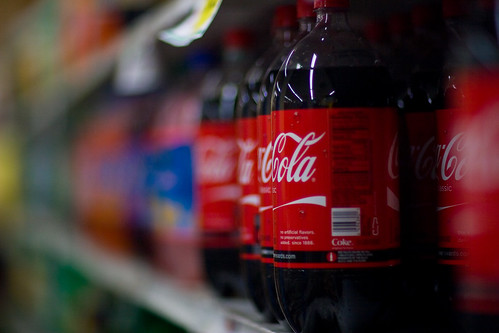 A little while ago, Senate Finance Committee Chair Max Baucus (D-MT) floated a set of "lifestyle-related" taxes in his "Description of Policy Options." Among these policy options was the proposal to raise taxes on sweetened non-alcoholic beverages, a proposal that soon seemed to fizzle in light of overwhelming public opposition.
A little while ago, Senate Finance Committee Chair Max Baucus (D-MT) floated a set of "lifestyle-related" taxes in his "Description of Policy Options." Among these policy options was the proposal to raise taxes on sweetened non-alcoholic beverages, a proposal that soon seemed to fizzle in light of overwhelming public opposition.
However, this week, the chief of the Centers for Disease Control (CDC) and Prevention argued at a conference that increasing the price of food perceived as unhealthy "would be effective" at combating the obesity problem. Interestingly enough, only three years ago, researchers from the CDC reported that:
Evidence for the association between sugar-sweetened drink consumption and obesity is inconclusive…[N]ational data showed no association between sugar-sweetened beverage consumption and Body Mass Index."
Several other studies (see for example here and here) draw similar conclusions, and state that the impact of sweetened beverage consumption on a person’s weight is statistically insignificant.
Beyond that, obesity may be an issue in this country. But even if you accepted the premise that it is a public health issue and not a personal health issue, the tax code is not the place to address this issue. Tax increase proposals on products perceived as "sinful" or "unhealthy" amount to social engineering through the tax code, and the tax code should not be used as a consumer control device.
But let’s face it, this tax increase proposal is not about obesity, it is about revenue, and "sin taxes" in general provide an opportunity for government to pursue divide-and-conquer and nickel-and-dime tactics to generate more revenue to fund the expansion of government programs.
What’s more, this tax increase is highly regressive and would disproportionately affect lower- and middle-income taxpayers who are already hit hard by the economic crisis and are struggling to make ends meet. And we all remember President Obama’s promise not to raise taxes on anyone making $250,000 or less. However that promise was already out the window with the passage of the federal excise tax hike on tobacco early this year, so taxpayers shouldn’t hold their breath that Obama’s promise will shield them from a tax hike.
The economic damage this tax increase brings with it should also not be forgotten, especially as our economy continues to shed job. The beverage industry and affected industries employ hundreds of thousands of workers, and jobs would most certainly be at risk.
A broader issue that comes into play with these types of life-style taxes is the fact that excise taxes aimed at reducing consumption of a product of often turn into "placeholders" for future tax increases. While on the one hand trying to discourage certain behaviors through these tax increases, government would find itself in the contradictory position of at the same time relying on the continuance of such behaviors as a revenue source for the programs funded. Ultimately, these excise tax hikes serves a placeholder for the next tax increase that will likely be required to sustain funding levels once revenues dwindle when consumption does drop.
There are a lot of things that some say are "bad" for you. Tobacco, soda, snacks and fast food, salt – where do you draw the line? What’s next on the list? They say high heels aren’t healthy for your feet and back. Ladies, your Jimmy Choos might be next.
This soda tax hike proposal fizzled for good reasons – let’s hope they don’t refresh it.
Photo credit: Vox Efx

